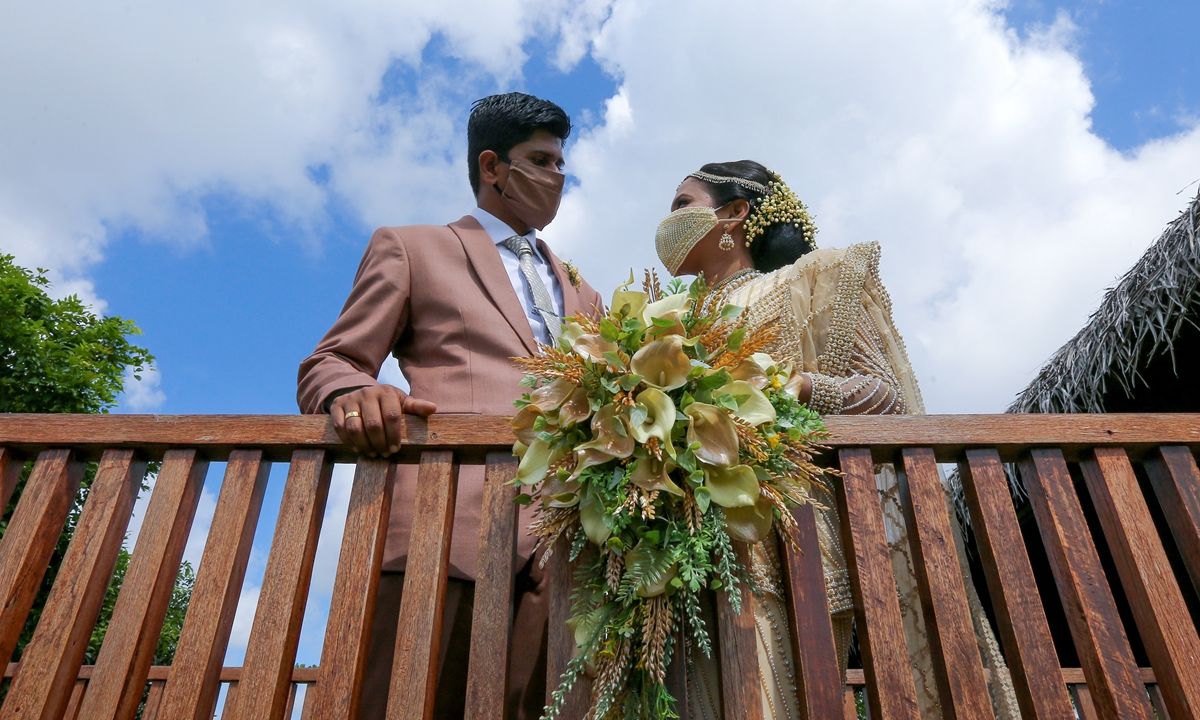Weddings are a part and parcel of every tradition around the world and by far holds paramount importance both on traditional as well as cultural terms. Covid 19 however has impacted every tradition, every culture and virtually the entirety of the world. From the lives of millionaires to the middle class and further down the poorest class of the society, this pandemic has impacted the lives of everyone. The companies have turned to the virtual world, schools and universities made applications like zoom and google meet famous overnight, and Weddings saw new paradigms emerging in both virtual as well as eco-friendly forms. Covid 19 might have had bad impact on every other sector but it has given weddings a new window to evolve and a new chance to leave behind its norms which do not concede with the need of the time.
One who lives in India knows how big a deal a wedding is; it’s not just a social construct or a plain legal agreement between two people. India places marriage at a much higher pedestal in its cultural and social realm. Wedding in India is not restricted to two persons coming together and making a world but a pious unbreakable solemnization of two soul. Shakespeare would have understood India’s marriage culture evident from his lines, “Let me not to the marriage of true minds admit impediments. Love is not love which alters when alteration it finds.” In India marriage is said to be a “saat janam ka rishta” (a bond made for seven lives) and is given paramount importance.
Covid Impact on Weddings

Having established the importance of marriage in Indian culture one would understand how big a hit for the country it would be if one such important norm takes a hit. The hustle and bustle characterize an Indian wedding, and the entire journey of wedding is one of utmost importance for not only the couple but also their families, hence(keeping in mind the hue size of an average Indian family) hundreds of thousands of people’s happiness and importance is linked to one single day! This journey has many days making wedding no one day affair. Notwithstanding the diversity of India and different religious norms of weddings, no wedding in India is a single day affair (with some exceptions say court weddings) because the rituals take days and days to take place. For example a Hindu marriage can take as long as 15 days, a Sikh marriage can take up to 5 days, and similarly an Islamic marriage.
This pandemic has forced the countries to enforce complete lockdown and India is no exception. Since 23rd March, 2020 India has been under a nationwide lockdown which has recently been relieved to some extent. Many activities were prohibited during the lockdown including weddings. No gathering was allowed and hence it became a drag for the ancient ritual of marriage. There were some mishaps in the marriage industry but one has to overlook the mountain in order to see the sea. The pandemic gave weddings a chance to evolve and in way instigated it. News of virtual weddings all around the country came to the surface. Such innovative use of technology is only possible in times of emergency and this is just that time. Weddings also shed their old skin and took a new glowing form. This came in terms of eco-friendly weddings which left behind the norms of bursting crackers and harming the environment. The pandemic also forced weddings to evolve in terms of quality by restricting the quantity.
The Predominant “Good” in the Systematically Spread “Bad”
Unlock 1 and subsequent Unlock 2 have given new way to weddings but with some restrictions. These restrictions include not allowing more than 40-50 people in a wedding with proper social distancing. These restrictions might prima facie appear to be authoritative and rudimentary but have a split side . The restrictions do put a bar on weddings but these very restrictions have also given weddings a greater chance to evolve. It is an established fact that negativity spreads like wild fire and positive news holds parallel position to the water coming out of the nozzle of a firefighters pipe trying to quench the fire. The upsurge of new forms of weddings is just that water which is slowly doing away with the fire. These new forms or weddings are a good news for the society but have not become a part of mainstream media yet.
The Economic gain
One of the characteristic features of an Indian wedding its expenditure. A typical Hindu wedding for example as mentioned has a 15 day length which includes different rituals. Now for these rituals venues have to be booked, catering has to be reserved, there is decoration and there are numerous other expenses. Before wedding there is a reception which requires a lot of money. Generally in typical weddings, the number of people attending the wedding is huge which includes the families of the bride and the groom, their social circles, their professional circles etc. But with the lockdown restrictions, restricting the number of people to 40-50, a new window of liberty and an extra layer of opportunity is granted to the families to have the wedding in grander way. With the expenditure being the same and the number of people reducing, a family can bear more exclusive venues, better and more delicious catering and subsequently the quality of a wedding increases exponentially. With proper permits, even destination wedding which ideally had been a dream for most middle class families is very much possible and in the ambit of their expenditure.
The Sociocultural gain

A normal wedding includes a lot of people and mentioned earlier, this makes the wedding very crowded and there is not enough time for everyone to interact with everyone else and hence making the social circle i.e. the families of the couple very loosely connected. As a result of which the families fail to understand one another’s culture which might in future lead into misunderstandings. Also, as a compulsion some people who are not very important to either of the families have to be invited for the wedding, which only in turn amplifies the crowd helping no cause. With these restrictions and the bar on the number of people to less than 50, it gives a fair chance for everyone to interact with each other and comprehend one another’s culture. A bar on number also make the families invite only the most important people to the wedding. Hence, there is a firm bonding between the most important people of the two families, giving the wedding a rock solid foundation and hence, as said improving the QUALITY of the wedding.
The Eco-friendly angle

It is not a hidden fact that Indian weddings do contribute to the already radical level of pollution and in many ways. In a majority of weddings, the proverb goes as “dhoom-dham se manaenge” which translates to “will celebrate with hustle and bustle.” Now this dhoom-dham incorporates a lot of crackers converting the metaphorical idea of celebrating with a bash to actual booms in the sky! Crackers and other celebration forms make their way into most Indian wedding harming the environment in a tripartite way- air pollution, noise pollution and global warming. Further the wastage of food is also a major concern for most Indian weddings. Now with the restrictions on, the families have to resort to more peaceful wedding and with less number of people, the wastage of food will also be low. These supposedly small factors make huge differences. In fact eco-friendly weddings have already started to make their way, In Morbi district of Rajkot, two different marriage parties, one led by Divyesh Kundariya and the other by Jaydeep Kaila performed a short and simple wedding with no hustle or loud noises.
A New Paradigm of Wedding!
With the world on pause and disasters taking place almost every other day, 2020 has become a year which will be recorded in history as one of the darkest and most negative years. It de facto becomes difficult in such a scenario to search for positives and call for Albus Dumbledore’s words. Dumbledore said, “Happiness can be found in the darkest of time only if one remembers to turn on the light.” For us right now, this light is the new paradigm of weddings in process of evolution.
Notwithstanding the shock suffered to our tradition wedding culture, it is equally important to acknowledge the need of the time. Nothing which does not adapt with time survives, not even the supposedly absolute law, hence it becomes important for us to let go of some cultural norms and adopt the new ways which time demands. New marriages have numerous pros, the most important being “Quality is better than Quantity”. With the number reduced, there is greater opportunity to improve the quality of marriage. May it be better venues, better catering or better people, the process only gets better. The same is true with the dynamics of weddings with environment. Letting go of some hustle and bustle to contribute in saving the environment is the need of the time and by no means a bad deal. After all, nobody from outer space is going to help s=us humans, it’s on us and us alone.
Finally, the new wedding paradigms are here to stay and it’s about time we adopt them. With numerous opportunities for improvement of quality and a contribution to saving the nature, there is nothing negative in the new norms and I believe this right here is the NEW NORMAL.







